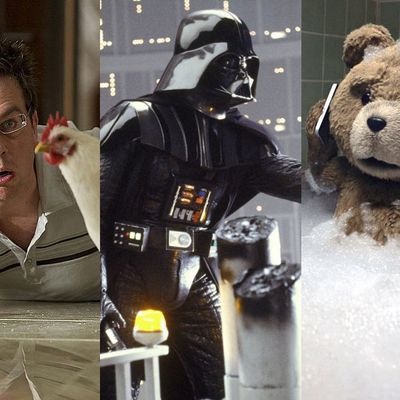
In a movie year crowded with remakes, sequels, and superheroes, one weekend stood out as a bastion of sweet relief: the weekend of June 29. After that three-day frame ended, the box office was topped by a trio of original movies in Ted, Magic Mike, and Brave, significant hits all. In fact, they were such big hits that the studios and filmmakers may not leave well enough alone: Universal plans to get a Ted sequel into production as soon as it can; Channing Tatum has been talking up Magic Mike 2; and in today’s sequel-friendly era of Pixar, a second helping of Brave feels like an inevitability. Is anything truly free of franchise potential anymore?
This week brought news that, in the wake of Disney’s acquisition of Lucasfilm, the company would begin putting out Star Wars sequels every two to three years for as long as those whirring lightsabers remain lucrative. Obviously, George Lucas has hardly been shy about turning his once-humble space saga into a megafranchise, but until this week, the Star Wars films have been confined to two discrete trilogies, and while the prequels remain a controversial proposition, at least they were arguably in the service of a six-film story about Anakin Skywalker’s transformation into Darth Vader. The new films, by contrast, may be able to mine the worlds created by Lucas more effectively than Lucas himself was able to with the prequels, but they’ll still feel superfluous to what was the main gist of Star Wars until now. And though new Lucasfilm head Kathleen Kennedy says that the next three Episodes — VII, VIII, and IX — will make up a new trilogy, that only goes so far when you know that an Episode X will be hot on their heels.
The James Bond model of franchise moviemaking used to be a special exception, but increasingly, it looks like the norm for conglomerate-owned studios: Pump out a new installment every two years or so, and when the original star falls out (or box-office receipts take a dip), simply recast or reboot. Even before The Dark Knight Rises was released, Warner Bros. executives acknowledged that Christopher Nolan’s concluding installment of his trilogy would be followed, in all likelihood, by another Batman reboot in a mere few years. (We’d expect WB to explore similar options soon when it comes to its lucrative Hangover franchise.) And with Disney’s Marvel Studios putting out two tentpoles a year, it’s likely that the Hulk won’t be the only Marvel character who looks different from film to film: By the time they make a fourth installment of The Avengers, the whole cast list could be changed, with the newest hot comic actor subbing in for a too-expensive-by-then Robert Downey Jr.
In ten years, then, will we still be getting the same huge franchises we have now? Already, the big-budget movies in 2013 and 2014 look awfully familiar; next year alone brings sequels to Die Hard, G.I. Joe, Scary Movie, Iron Man, Star Trek, The Fast and the Furious, The Hangover, Monsters Inc., Kick-Ass, Despicable Me, Grown-Ups, Wolverine, The Smurfs, 300, Red, Percy Jackson, Cloudy With a Chance of Meatballs, Thor, The Hunger Games, and The Hobbit. (Whew.) Well-made movies can’t rest on their own anymore; the only thing that prevents sequelization these days is an outright box-office bomb. It helps if somehow the creator — and not the movie studio — can contractually retain the rights to his original work … but then again, Lucas owned Star Wars, built his own studio around it, and then realized he had to keep feeding the beast with more big-screen sequels.
So take a look around, guys: The movies that are huge hits today may well be the same movies that Hollywood is making ten or twenty years from now. Sure, there will still be original movies that break through, and when they do, box-office analysts will herald them as proof that moviegoers have gotten tired of the same-old, same-old, that audiences yearn for original product. And then the studios will make sequels to them.




